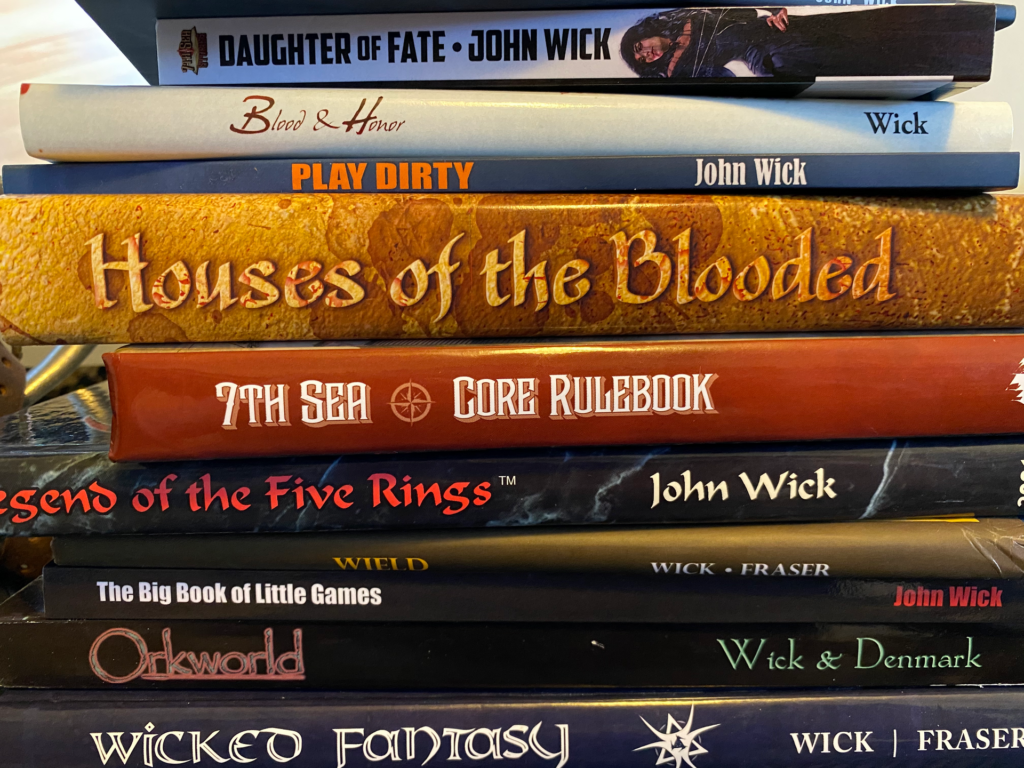-
A Justification for a Lightsaber
(This essay is SPOILER FREE. So, continue reading.) I’m finally doing it. I’m getting a lightsaber. I was nine years old when I saw Star Wars—not Episode IV, but goddamn Star Wars—for the first time. Of course, I saw it a few more times that year. I raked leaves and cut grass to buy a…
-
Supposed Former 7th Sea Junkie
Way back in 1998 (geez, I’m old), Alanis Morissette released her follow up to Jagged Little Pill, an album that sold over 16 million copies (thus going platinum 16 times). JLP was a phenomenon, breaking records every which way. Of course, her follow up, had the impossible task of meeting the same expectations. Supposed Former…
-
DragonCon Part 2: Antitheism and Forbeck’s Law
Let’s start with the latter, shall we? Matt Forbeck writes a lot of words. Tons of them. I used to hang out with him a lot at conventions, although we don’t get the chance to do that anymore. One time, I was sitting in a seminar with seven people on the panel. Seven! Meanwhile, out…
-
Heroic Stories in Khitai
Khitai presents opportunities for heroic stories very different than the ones we see in western culture. The typical western hero is a renegade, rebelling against the corrupt tyranny of society. In the west, we distrust authority, often casting such figures and structures as villains. Think of Darth Vader and the Emperor in Star Wars, the…
-
DragonCon Part 1: “Can’t I Have Just a Little Peril?”
This is the first part of a series of blog posts about DragonCon. Part 2 and 3 will be up soon! I was at DragonCon this weekend and addition to staying up way too late and dancing way too much, I was also a panelist. The panels at DragonCon are different from the ones at…
-
Vote for 7th Sea at the ENnies
Summer is con season, but that also means it’s awards season. We got nominated for an Origins Award, won a Golden Geek, and now, it’s time for the ENnies. Usually, I don’t get excited about awards, because I’ve won my share, but this year is a little different. People like Mike Curry, Rob Justice and…
-
GLOW
Every GM should watch professional wrestling. Let me amend that. Every GM should watch good professional wrestling. And yes, before you ask, let me say that there is such a thing. For most people, their experience with the genre is limited to 80’s style WWF kick-punch-repeat. Well, my fellow gamers, that’s like someone saying, “I…
-
The War of the Cross: A Letter From John
Hi everybody! It’s hard to believe that the Kickstarter launch for The War of the Cross is just one week away. We’re going to be publishing updates every day this week to talk more about the game and to share our excitement. Today, I’m here to tell you a little bit about the history of…
-
Wonder Woman
The first person I fell in love with was Wonder Woman. In 1975, when I saw her first, I was only seven years old. Sitting in the little room where our family set up the TV, watching her on the screen, I fell in love. Now, being only seven, I had no idea what I…
-
Awards Suck…Until You Win One
That picture is me holding the “Golden Geek” award for Best RPG from Boardgamegeek.com. See that look on my face? It’s a look of suspicion. As in, “I don’t trust you.” I have mixed feelings about awards. And as award season begins this year, I find myself thinking a lot about them. I mean, I…
